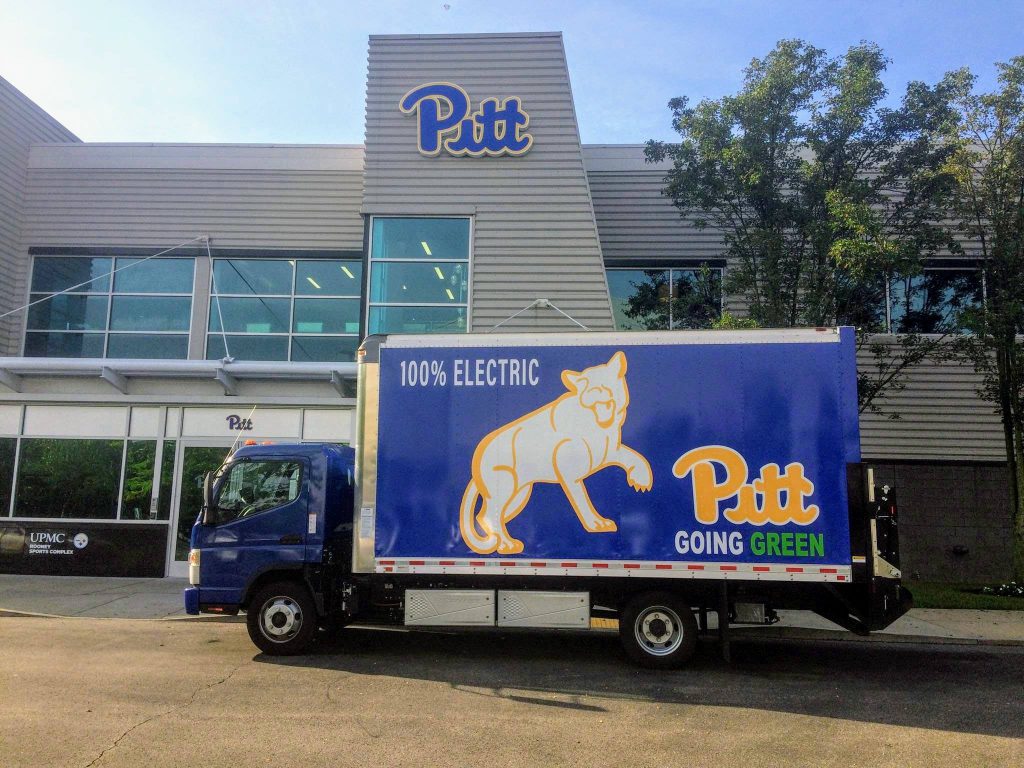4 Electric Box Trucks Come to Pitt
Pitt’s first electric vehicles are light-duty box trucks used for transporting mail, lab supplies, surplus property, library books, & other goods around campus.

Pitt is driving toward its greenhouse gas reduction goals with the addition of new zero-emission electric vehicles to its fleet. Four diesel box trucks used by Pitt’s Central Receiving Office for campus moving and delivery services have been replaced with Mitsubishi Fuso vehicles that can travel 60-80 miles on a single charge.
These trucks are not only cleaner, they’re also quieter than their predecessors. And they’re among just a handful of their kind in North America. Launched in 2017, the Mitsubishi Fuso eCanter is billed as the world’s first all-electric light-duty truck in series production. The University’s vehicles are among the first wave of 500 trucks delivered worldwide, according to a company spokesperson. While most of the initial deliveries in the U.S. went to New York or California, five were delivered to the Pittsburgh area — four to Pitt and the fifth to UPS.
These vehicles will further Pitt’s progress toward energy and emissions reductions specified in the 2018 Pitt Sustainability Plan. “One of the Pitt Sustainability Plan’s goals is to reduce greenhouse gas emissions 50% from University vehicles by 2030,” said Pitt Sustainability Director Aurora Sharrard. “Parking, Transportation and Services has shown great leadership in procuring four electric box trucks, which immediately eliminate both localized air pollutants and greenhouse gas emissions.” Combusting diesel fuel creates greenhouse gas emissions as well as other air pollutants, Sharrard said. “Localized sulfur dioxide, nitrogen oxides, particulate matter, ozone and other pollutants contribute to the Pittsburgh region’s poor outdoor air quality.”
Converting to electric vehicles — and using renewable energy for charging them — eliminates these pollutants at their source. The trucks are recharged at Central Receiving using a pair of energy-efficient chargers that can provide 25 miles of travel for each hour of charging time, or 25 RPH (range per hour.) A $7,000 grant from The New American Road Trip, a nationwide electric vehicle tour across America, helped support the installation of the charging stations. Currently, about 14% of Pitt’s electricity comes from renewable sources, Sharrard said. The goal under Pitt’s sustainability plan is to produce or procure 50 percent of its electricity from renewable sources by 2030.
Jeff Woodall and Oscar Schneider are among the drivers from Central Receiving who are behind the wheel of these new vehicles. They typically drive more than 40 miles in the course of a day, transporting mail, lab supplies, surplus property, library books or whatever needs moving around Pitt’s urban campus.
Aside from the quiet operation — the trucks roll silently with no engine noise — they’ve noticed little difference between these and conventional trucks. “There’s zero difference in power, even up the steep hills,” said Woodall.
“I was amazed,” said Schneider, who initially was skeptical about the battery-powered vehicles’ ability to handle heavy loads, such as 1,000-pound tanks of gases they transport to University labs. It’s been no problem. At the end of the day, he typically has one-half to one-quarter of a charge remaining, he said.